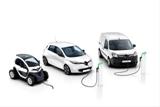HMRC will introduce an advisory fuel rate (AFR) for pure electric cars from September 1 at 4 pence per mile (ppl).
It is a partial victory for fleet representative body ACFO, which has been campaigning for AFRs for both pure electric cars and plug-in hybrids.
The new rate, called the Advisory Electricity Rate (AER), has been set at 4p per mile and will be published alongside AFRs for petrol, diesel and LPG (liquefied petroleum gas) cars based on engine size.
Plug-in hybrid and hybrid cars will continue to be treated as either petrol or diesel models for mileage reimbursement purposes.
AFRs apply where employers reimburse employees for business travel in their company cars, or require employees to repay the cost of fuel used for private travel. They are deemed to be tax and National Insurance-free. AFRs are reviewed quarterly and similarly, the new AER will be kept under review.
In notifying ACFO of the introduction of the new rate, HMRC said: “HMRC will accept that if employers pay up to the Advisory Electricity Rate of 4p per mile when reimbursing their employees for business travel in a fully electric company car there is no profit – there will be no taxable profit and no Class 1 National Insurance to pay.
“On a similar basis to Advisory Fuel Rates, employers can use their own rate which better reflects their circumstances if, for example, their cars are more efficient, or if the cost of business travel is higher than the guideline rate.
“However, if they pay a rate that is higher than the Advisory Fuel Rate and can’t demonstrate the electricity cost per mile is higher, they will have to treat any excess as taxable profit and as earnings for Class 1 National Insurance purposes.â€
For many years, ACFO has been calling on HMRC to publish official tax-free company car AFRs for plug-in vehicles. It has been ACFO’s belief that the absence of defined mileage reimbursement rates was a handicap to some organisations including plug-in vehicles on their choice lists.
Last year ACFO hosted a fleet industry summit, which included representatives of the British Vehicle Rental and Leasing Association (BVRLA), contract hire and leasing companies, motor manufacturers producing plug-in vehicles and fleet managers operating zero emissions and plug-in hybrid cars.
Together they called on HMRC to publish Advisory Fuel Rates for 100% electric vehicles, range extended electric vehicles, and plug-in hybrid petrol and diesel models and submitted suggested reimbursement rates and related calculations.
ACFO followed that up by launching an online petition earlier this year, which to date has attracted support from fleet managers operating more than 120,000 company cars.
ACFO chairman John Pryor said: “I am delighted that HMRC has listened to the voice of ACFO and its members and introduced an Advisory Fuel Rate for 100% electric cars and at the rate we recommended.
“Historically, HMRC has consistently said that it did not consider electricity to be a fuel so for it to make this change is a major leap and will assist all fleets operating and seeking to introduce pure electric cars.â€
However, he continued: “We are disappointed that HMRC has not supported ACFO’s call for Advisory Electricity Rates to be introduced for plug-in hybrid petrol and diesel cars and range extended electric vehicles.
“Plug-in hybrid models are a major part of vehicle manufacturers’ future electrification programmes and, as a result, an increasing number of such vehicles will find their way onto company car choice lists due to their benefit-in-kind tax efficiency.
“But without an incentive linked to how such ultra-low emission vehicles are used on the road, it will not prevent drivers using the combustion engine alone in a plug-in hybrid car.
“Plug-in hybrid vehicles are at their most efficient when driven for as many miles as possible on electric power. Therefore, particularly with technology advances likely to increase the electric range of such cars, publishing appropriate Advisory Electricity Rates for plug-in hybrid cars will help to encourage drivers to use the car in the optimal environmentally-friendly way.â€
Pryor concluded: “Therefore, we will keep up the pressure on HMRC to introduce Advisory Electricity Rates for plug-in hybrid cars as well as for range extended electric vehicles.â€








